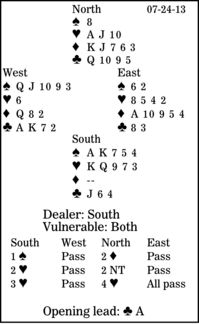Bridge column, July 24: Analyze the auction to defend well

This week we are noting that defenders shouldn't trade the acronym "trade" for anything. We have reached A for audition the auction. It is important for the defenders to use the information gleaned from the bidding to help the defense.
In this example, East has to make the key play. Against four hearts, West leads the club ace: five, eight, four. West continues with the club king: nine, three, jack. West plays a third club, East ruffing and South following suit. What should East do now?
South's sequence, opening in spades, then bidding hearts twice, showed at least 5-5 in the majors. North went with the 5-3 heart fit, hoping that some spade ruffs in his hand would help. (Note that three no-trump should be defeated.)
East gave a high-low to show his doubleton club. And since West was watching, he was not distracted by South's jack falsecard at trick two.
East now knows that South started with three clubs. So, as declarer must have 5-5-0-3 distribution, trying to cash the diamond ace cannot be right. Instead, East should exit with a trump, aiming to reduce the spade ruffs in the dummy from three to two.
This defeats the contract. If East doesn't return a trump, declarer can cash his top spades and crossruff home.
** ** **
COPYRIGHT: 2013, UNITED FEATURE SYNDICATE
DISTRIBUTED BY UNIVERSAL UCLICK FOR UFS

